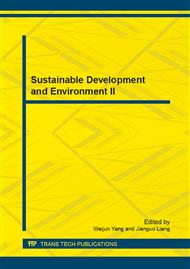p.1502
p.1509
p.1515
p.1524
p.1529
p.1535
p.1539
p.1543
p.1547
Solutions for Problems Related with Electronic Information Industry Development in Chongqing
Abstract:
Currently electronic information industry is in rapid development in Chongqing. While electronic products as well as electronic wastes will introduce potential ecological risks and there are many pollution cases related with them. Background of rapid development of electronic information industry in Chongqing can be described as follows: on the one hand, environmental standards and regulations for this industry in developed countries are stricter than before. On the other hand, related environment problems have already been obvious and serious in Guangdong, which leads to the transfer of such industry into inner regions such as Chongqing. In addition, there will be a hysteresis effect for the potential ecological risk and dangers, which lead to potential worries to the rapid development of electronic information industry in Chongqing. To get around of the trap of development, many problems should be dealt with in Chongqing as follows: global survey on product potential pollution and standards of electronic information industry; investigation on existing pollution cases; environmental impact evaluation on rapid development of electronic information industry in Chongqing. The suggestions and solutions are as follows: international environment standards should be adopted in Chongqing; special privileges should be avoided in industrial development environment building, which will be helpful to keep the strict environment standards; as for special aspects with uncertain environmental impacts, scientific support should be provided, which will be used to support reliable and sensible policy-making.
Info:
Periodical:
Pages:
1529-1534
Citation:
Online since:
September 2013
Authors:
Price:
Сopyright:
© 2013 Trans Tech Publications Ltd. All Rights Reserved
Share:
Citation:


